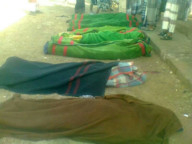
Sana’a: Suspected Al Qaida militants launched dawn attacks in Yemen on Friday killing at least 56 security personnel in the deadliest assault on troops since the army retook jihadist strongholds last year.
Two of the three attacks in Shabwa, a southern province where Al Qaida has long been active, involved vehicle bombs, military officials said.
Eight of the militants, among them two suicide bombers were also killed.
The deadliest single attack was at an army camp responsible for ensuring security at oilfields in the region, where 38 soldiers were killed, the sources said.
“Troops clashed with gunmen at the camp entrance, before a suicide attacker in a bomb-laden vehicle forced his way into the camp where his car exploded, killing 38 soldiers,” said a government official in Ataq, capital of Shabwa.
Military sources confirmed the toll.
Simultaneously, “a suicide bomber in a car blew himself up before reaching his target - an army checkpoint” in the nearby Al Nushaima area, a military official said, adding that 10 soldiers were killed in that blast.
“Soldiers were captured” in Al Nushaima as others fled, witnesses said.
Around 15 kilometres away, suspected Al Qaida gunmen targeted a special forces camp at Maifaa, killing eight police, military sources said.
The authorities blamed the bloody dawn attacks on Al Qaida in the Arabian Peninsula (AQAP), described by Washington as the jihadist network’s deadliest franchise.
The attacks were the deadliest since May 21, 2012 when some 100 soldiers were killed and hundreds more wounded in a suicide bombing in the capital. AQAP claimed that attack in a statement posted on jihadist Internet forums.
But in June 2012, the army recaptured large swathes of the south which Al Qaida had held for nearly a year, taking advantage of the weakness of central authority during the 2011 uprising that forced out veteran president Ali Abdullah Saleh.
Since then, AQAP has carried out mainly hit-and-run attacks as its militants have come under mounting attack by US drones.
President Abd Rabbo Mansour Hadi said a wave of drone strikes on Al Qaida targets during the past two weeks killed 40 militants, including some ringleaders in the Sana’a region.
On Sunday, a court in the capital jailed three AQAP militants for plotting to assassinate Hadi and the US ambassador.
Last month, security was beefed up around Western embassies in Sana’a, and some closed following warnings by Washington of an imminent attack.
Since he came to power, Hadi has repeatedly pledged to press the battle against Al Qaida in what is Osama Bin Laden’s ancestral homeland.
Hadi said a bid to attack an oil terminal in Yemen had been foiled after a phone call was intercepted between Al Qaida chief Ayman Al Zawahiri and AQAP leader Nasser Al Wuhayshi.
On August 7, Yemen said it had foiled an Al Qaida plot to storm the Canadian-run Mina Al Dhaba oil terminal and seize the port of Al Mukalla capital of the eastern province of Hadramawt.
But AQAP has denied plotting any such attacks.












